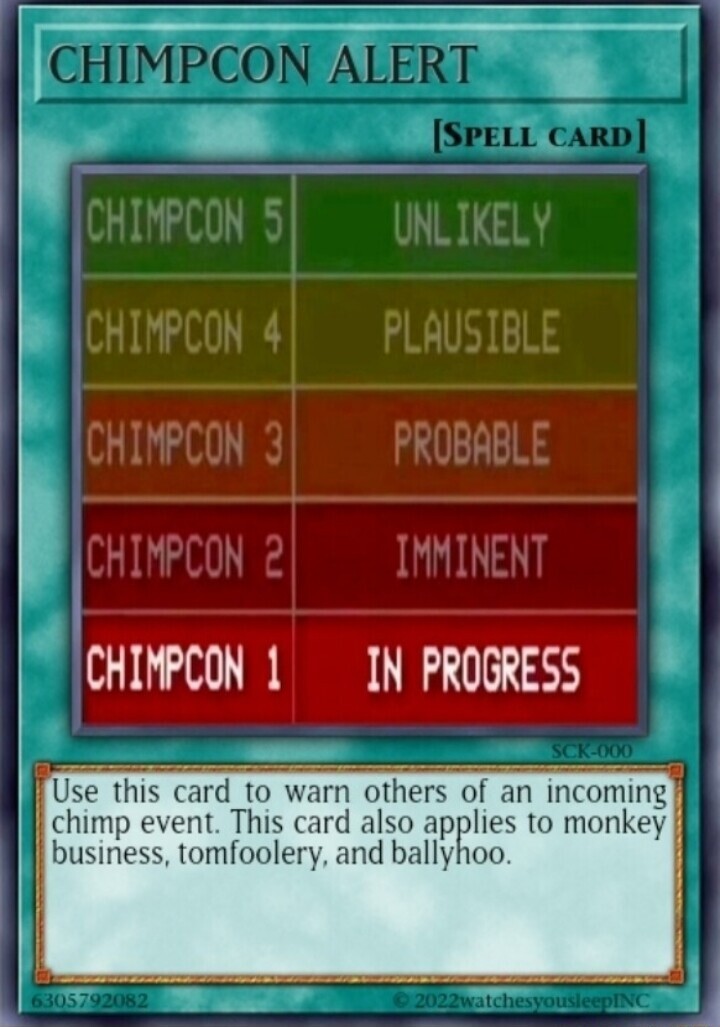My foreman would always say “Love my job” in a happy tone after anything bad happened on a job site. The happier the tone, the worse it was
then comes the singing.
“Dear God, he’s doing H.M.S. Pintafore. We have to leave. Now!”
I know that guy
I feel like the one going on about defcon does not know defcon 5 is actually pretty chill
Should’ve gone the Kanye route and said defcon 3
*death con 3
Fun fact: in America asking “how’s it going?” is just a greeting, nobody really cares
Brits ofen say “You alright?” As a substitute for “Hi.”
Pretty jarring when you’re not used to it. Id think “God, I must look like shit if they’re genuinely checking on my welfare!”
Yeah Tom Scott did one of his linguistics videos about that, he had a word for it but some questions aren’t really questions they’re basically just rituals, though rephrased a different way makes them genuine questions, and when you have major dialects of the “same” language like British and American English, we use different ones. “Are you alright?” is basically a noise of greeting in Britain and an expression of genuine concern in America, while “How are you?” is the reverse.
Chinese version 你吃了吗 or variations on that, although it’s not used so much anymore. Literally means “have you eaten”, except it doesn’t really require an answer. I imagine it came up in that video, but it’s a good one.
Literally means “have you eaten”, except it doesn’t really require an answer.
Grandmothers in every culture
When I moved to London, I remember the old lady at the laundromat addressing me as “love”
I was like: “Damn, over here my charm even works with old ladies”
As it turns out, calling somebody “love” it’s just a way of addressing people in some English regions.
Won’t stop us from having a conversation or even just bitching about something that is randomly bothering us.
I always respond thoughtfully to people I don’t like. Then I ask how they are and watch them squirm.
be advised: this will not work with the majority of neurodivergent people
It me!
Which is also probably why I give this answer. Because it irks me to some degree that we just throwaway important questions like another human’s well-being.
If someone responds without being tripped up, I sorta know they’re my kind of person.oh same haha, if someone asks me a question they’re getting the answer, i don’t care that they expected a “i’m fine”
I just realized that I contradicted myself. I said that I use this with folks I don’t like, and then that when I use it, if someone responds well, that I know they’re my kinda people.
I don’t exclusively use it with folks I don’t like! I also throw it out playfully. It’s validating when folks respond in-kind.
depends on the part of America. in some rural areas no but in the city absolutely
It’s really like that everywhere, in my experience.
It’s at most small talk, not a license to dive into one’s life story.
Germans: na?
My favorite to use: “not gonna lie to you.”
My coworker once when I asked him a hard question: “Don’t make me lie to you.”
I still think of that a lot and try to work it in when someone asks me an impossible question.
when someone asks me an impossible question.
I think that response actually works for the loaded question:
“Have you stopped beating your wife?“
Easy answer: No
Though someone can assume another answer it should be followed up by another question, such as: why not? Then you can explain: “Never started” for instance
Though the answer of “don’t make me lie to you” is still a good one and prevents further questions
Implying that you… sometimes do!? :-P
When it comes to how I’m feeling? Sure, often even
Implying that if you said “i’m (fine/ok/alright/good/etc)” would be a lie.
Since it is super easy, barely an inconvenience, I am going to share this link from where my statement came from:-)
(I wish Lemmy would show preview pics of YouTube videos to let people have a glimpse of what they are in for, but hopefully my hints were enough here:-)
Oh! Thank you for the context!

(off-topic: I LOVE this cat)
Not off topic at all - when he showed up, the topic became all about him, in true business cat style - he will not allow it any other way!!! 😹
I usually just go with “sheeeeeeeeeeiiiiiit”
“I’m doin.” -I am not doing well and I don’t want to talk about it. But I’m also too exhausted and shattered to keep lying about my mental state for the sake of social niceties, so I’m hoping my vague, neutral statement will either convey what I’m feeling, or you’ll fill in the blank with whatever you want to hear. Just as long as you stop asking how I’m doing.
Oof
“Too blessed to be depressed” - they’re a Christian fundamentalist who is depressed but trying to convince themselves otherwise. You should run.
I’m here ain’t I = Defcon 5
So normal then?
Yeah, def on 5 is basically civilian peace times, right?
Living the dream!
Nightmares are dreams, right?
“Living the dream!”
“Oh yeah?”
“Yeah, I hope to wake up any day now.”
Gonna
stealpirate thatR
It’s been like three years of hearing that and they’re still working the same job lol…
I prefer “living a dream”.
Am I living someone else’s dream? Is it a nightmare? Am I disassociating? – the answer is “yes”.
“Hanging in there”

Look, I’m a cherry!
.
Defcon 5
I never know if they’re meaning that it’s not that bad, or if they actually mean defcon 1.
Because with defcon, the lower the number, the worse the situation.
Defcon NaN
“The situation is so bad, it can’t even be defined!”

Seems very American. If you ask a German you be prepared to not get Smalltalk.
This isnt small talk, this is a survival mechanism to figure if the person will enact violence on you or not. Optimally you want the response to be empty words, grunting, or being told to fuck off.
Optimally you want the response to be empty words, grunting, or being told to fuck off.
US/DE/both, did you mean?
I was referring to US culture. The most exposure to Deutsche culture is through part of my family culture and that ancestor left back when the HRE was still in living memory and not even old living memory.
A friend of mine, married to a European, said that I should have been born in Europe, not the US, due to my hatred of small talk.
It really depends on the country and people’s personality.
In my experience in Southern Europe people tend to love share stuff about themselves (and will easilly go into their life story) whilst in Northern Europe getting anything about them without having a long acquaintance with them is very hard if not impossible.
Apparently the Finnish are very averse to small talk (pretty much the opposite of Southern Europe).
Then there are also other variances - in Britain they’ll tend to portray themselves as better than they really are feeling, in Portugal they’ll tend to complain about life and things and in The Netherlands, if you do get them to open up, they’ll be very matter of fact.
After language, it’s maybe the hardest kind of thing to get used to when going to live in another country.
Finland is very good for people who hate smalltalk.
Sounds amazing. I should move to Germany for a while.
Wh… what’s y’alls base suicidality level
Our national holiday consists of drinking and playing with explosives at nighttime. You do the math.
It’s generally a very cheerful level of suicidality though! Would be awful to bring the mood down by making a suicide all somber or some shit.
Yah we kill ourselves, Or overly think about it, with extreme excitement and joy over here.
Also one of our best known sub-cultures is one in which the concept of health and safety are slurs when used outside of work. I should know I am a relatively cautious Redneck, that just means I actually keep the medkit nearby for if shit goes worng.
it’s not bad
Fair to middlin’
“I’m okay”? “I’m not too bad” would mean that you’re near the base suicidality level
Wouldn’t jump into a running vehicle. But wouldn’t try to try to climb up a cliff
Where does “Good enough” fit on the scale? Asking for a friend…
“Good enough” is “My head is barely above water and I’m wondering if it’s worth the effort”
Good enough= My day is shit, My week is shit, My life has been shit, but it’s not as shit as other people so I don’t have the right.
It’s the suffix that hits hardest:
… it’s not as shit as other people so I don’t have the right.
~at least that’s what my friend that I’m asking for definitely said~
In the opposite direction, when I moved to England it took me a while to get used to compliment “inflation” over there.
For example when somebody’s opinion on something is:
- “interesting”, it means it’s shit
- “ok”, means it’s bad or mediocre
- “good” and “great”, means it’s average
- “wonderful” and “amazing”, means it’s good
I once asked one of the natives how did they transmit the message that they trully believes something was a 10/10 and was explained that’s done by going into details on how something is so great.
Meanwhile Germany:
- “interesting” means it’s shit
- “it goes” means it’s bad or mediocre
- “ok” means it’s average
- “can’t complain” means it’s fairly good
- “very good” means it’s great
- “really not bad” means surprisingly great
in Ordnung
I’m German and for me, “can’t complain” means I have nothing to complain, I’m fine, nothing special
I find Germans have an easier time replying to things very frankly and without garnishment or humor. I can ask a German, “How are you?”, and he may reply with “I’m fine” and it can be taken at face value.
Americans tend to be more, I don’t know, conflict avoidant in their replies? There’s more expectation of subtext, of irony, and it’s not as typical to take “I’m fine” at face value.
“Can’t complain” is another good one. It’s often heard as, “I can’t complain [because nobody would listen anyway]”. Tone is important, as is environmental context. Blue collar workers at the site say this, yeah their day is going to shit. Your buddy says it over drinks, maybe he’s having a neutral, normal time of life, or maybe his life is going to shit and he’s giving the ironic answer to avoid diving into his real issues, while still communicating that things are not perfect.
Last week I was asked how my day was. It had been a perfectly normal, decent day, good time at work, beautiful weather, and my reply was “Life’s a peach”. I got back, “That bad, huh?” Yeah, the American habit of taking genuine expression and searching for a darkness under it can be tiring sometimes.















